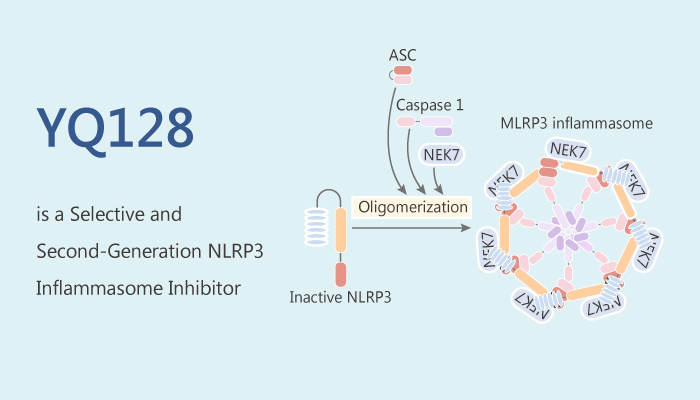In the NLR family, the NLRP3 inflammasome plays essential roles in the maturation and production of IL-1β and IL-18.
Dysregulation of inflammasome and IL-1β affects the pathogenesis of many human diseases initiates, such as autoinflammatory disorders, diabetes, and neurodegenerative disorders.
Therefore, NLRP3 inflammasome attracts extensive interests as a potential target of drug development for pathological conditions in which the dysregulation of overactivation of this inflammasome.
Several small-molecule inhibitors emerge in the market for the blocking of NLRP3 inflammasome pathways. Today we will introduce a sulfonamide analog, YQ128. This analog is an active NLRP3 inflammasome inhibitor. It has potential therapeutics for Alzheimer’s disease (AD), multiple sclerosis (MS) and traumatic brain injury (TBI).
YQ128 is a potent and selective second-generation NLRP3 (NOD-like receptor P3) inflammasome inhibitor with an IC50 of 0.30 µM.

Firstly, in primary mouse peritoneal macrophage cells, YQ128 suppresses the release of IL-1β from peritoneal macrophages upon LPS/ATP challenge. The IC50 value of the YQ128 release suppression is 1.59 µM.
YQ128 does not interfere with the production of IL-1β by NLRC4 or AIM2 inflammasome in J774A.1 cells. This result demonstrates the specific inhibition of the NLRP3 inflammasome of YQ128.
Nextly, in vivo, in C57BL/6 mice, YQ128 (oral administration) can penetrate into the CNS, the concentration is 21.3, 20.5, and 6.6 ng/l after 0.5, 1, and 4 hours, respectively.
Furthermore, in SD rats, YQ128 (intravenous injection) exhibits extensive extravascular distribution with a large steady-state volume of distribution (Vdss) of 8.5 L/kg. At the same time, the compound shows rapid total clearance (CLtot) of 41 mL/min/kg. This results in an intermediate terminal plasma half-life (t1/2) of 6.6 h after IV administration.
When oral administration is used, YQ128 shows gastrointestinal absorption with a tmax and cmax of 12 h and 73 ng/mL, respectively. The oral bioavailability of YQ128 is about 10% in the rat.
In summary, YQ128 is a selective second-generation NLRP3 inflammasome inhibitor-based a chemical scaffold represented by HL16. This compound is more than 4-fold improving inhibitory potency than HL16. YQ128 can cross the BBB to reach the CNS and is not likely subject to efflux transport. However, while PK studies reveal adequate systemic characteristics in rats, oral bioavailability is still low (10%).
Collectively, these findings strongly encourage the development of new analogs based on this chemical scaffold. Researchers need to explore new NLRP3 inflammasome inhibitors with improved PK properties.
Reference:
Jiang Y, et al. J Med Chem. 2019 Nov 14;62(21):9718-9731.